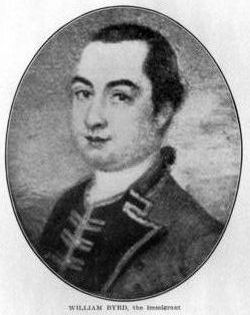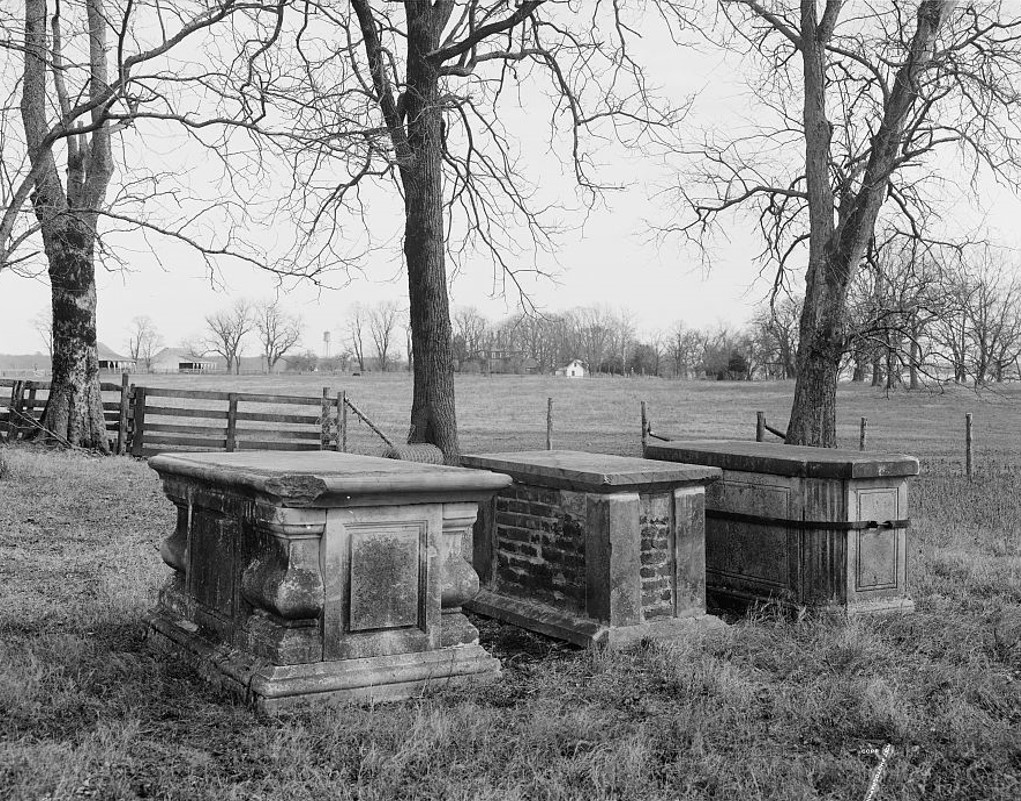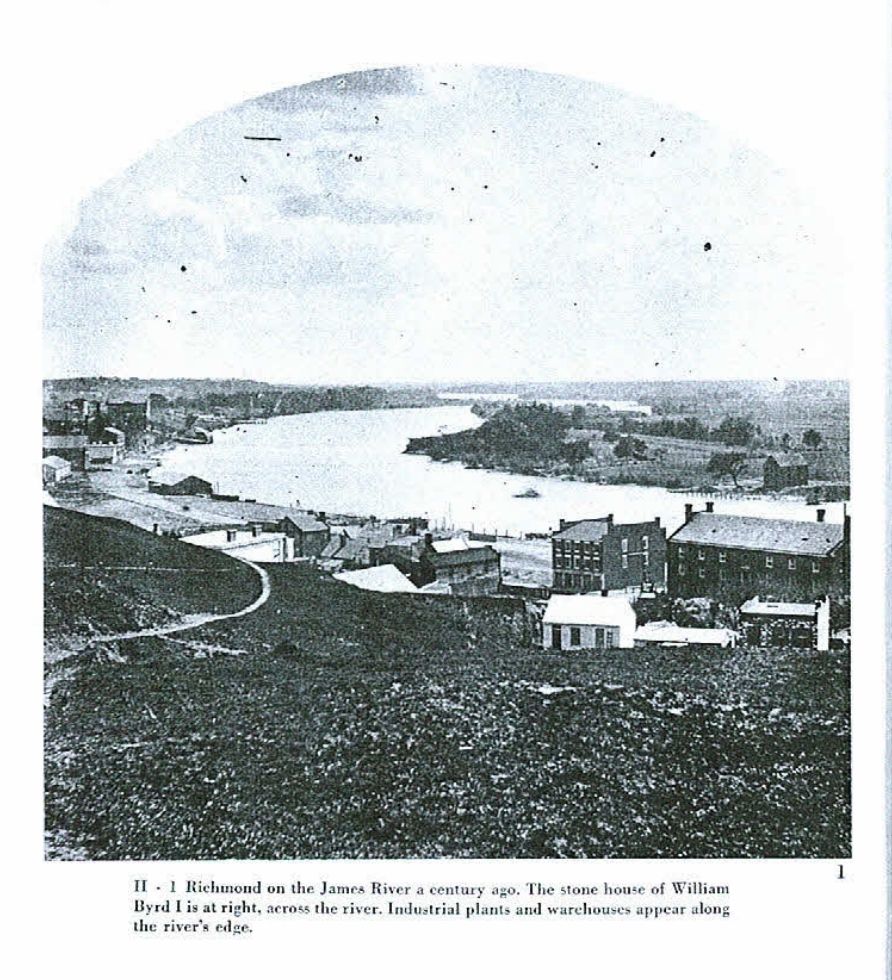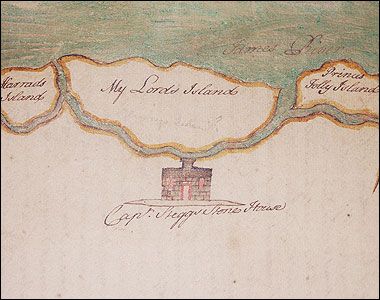After marrying Mary Horsmanden in 1673, their first-born child, William Byrd II (known as the founder of Richmond) was born On March 28, 1674, at the little stone house on The Falls in Henrico County. They later built what was called "Belvidere", a place that proved to be very lonely for Mrs. Byrd as her husband was away on business much of the time. In 1688 he purchased "Westover" a tract of about 1,200 acres in a more settled area in Charles City County. He built a commodious frame dwelling, later replaced by his son with an elegant brick mansion famous in Virgina history. He resided at Westover and continued to trade with England, the West Indies, and the Indians. His land acquisitions increased and he became one of the great land holders of Virginia. When he died it is estimated that he possessed at least 26,000 acres of land throughout Virginia.
He became rich and cultivated in Virginia and was the most remarkable early trader on the Trading Path. His most important business was Indian trading. His traders with their pack-horses went 400 miles to the southwest to trade skins and furs with the Cherokees and Catawbas.
William Byrd was appointed in 1680 as member of the Council on which he served for 24 years and Auditor of the Colony for 6 years. He inherited a wealth of information, Indian scouts, traders, and suppliers through his good fortune. As a young man, he traveled "far into the wilderness over trails which penetrated 400 miles as far as the haunts of the Catawbas and Cherokees" and as near as the banks of the Meherrin. He had a vast knowledge of the wilderness and amassed a considerable fortune in the fur trade.
In 1687 Colonel Byrd was commissioned Deputy-Auditor and Receiver-General of Virginia. For several years he held high rank in the Virginia Council, preceded only by Ralph Wormeley & Richard Lee. When Lee resigned in 1699, Byrd was second in position, becoming President of the Council in 1701 when Wormeley died. He was interested in botany and other sciences and corresponded with Leonard Plukenett, Sup. of the Royal Gardens of Queen Mary.
William Byrd died on 4 December 1704 and was buried beside his wife in the "old" Westover Parish Cemetery on the grounds of Westover Plantation 1/4 mile from the mansion. About 1730 the construction of today's Westover Parish Church was completed at its present site on Herring Creek about 1 1/2 mile north of Westover mansion.
Children:
William Evelyn Byrd II 1674–1744
Susan Sue Byrd 1676–1710
Anne Ursula Byrd 1681–1698
Mary (Molly) Byrd 1682–1725
Maurice Warham Byrd 1685–1689
After marrying Mary Horsmanden in 1673, their first-born child, William Byrd II (known as the founder of Richmond) was born On March 28, 1674, at the little stone house on The Falls in Henrico County. They later built what was called "Belvidere", a place that proved to be very lonely for Mrs. Byrd as her husband was away on business much of the time. In 1688 he purchased "Westover" a tract of about 1,200 acres in a more settled area in Charles City County. He built a commodious frame dwelling, later replaced by his son with an elegant brick mansion famous in Virgina history. He resided at Westover and continued to trade with England, the West Indies, and the Indians. His land acquisitions increased and he became one of the great land holders of Virginia. When he died it is estimated that he possessed at least 26,000 acres of land throughout Virginia.
He became rich and cultivated in Virginia and was the most remarkable early trader on the Trading Path. His most important business was Indian trading. His traders with their pack-horses went 400 miles to the southwest to trade skins and furs with the Cherokees and Catawbas.
William Byrd was appointed in 1680 as member of the Council on which he served for 24 years and Auditor of the Colony for 6 years. He inherited a wealth of information, Indian scouts, traders, and suppliers through his good fortune. As a young man, he traveled "far into the wilderness over trails which penetrated 400 miles as far as the haunts of the Catawbas and Cherokees" and as near as the banks of the Meherrin. He had a vast knowledge of the wilderness and amassed a considerable fortune in the fur trade.
In 1687 Colonel Byrd was commissioned Deputy-Auditor and Receiver-General of Virginia. For several years he held high rank in the Virginia Council, preceded only by Ralph Wormeley & Richard Lee. When Lee resigned in 1699, Byrd was second in position, becoming President of the Council in 1701 when Wormeley died. He was interested in botany and other sciences and corresponded with Leonard Plukenett, Sup. of the Royal Gardens of Queen Mary.
William Byrd died on 4 December 1704 and was buried beside his wife in the "old" Westover Parish Cemetery on the grounds of Westover Plantation 1/4 mile from the mansion. About 1730 the construction of today's Westover Parish Church was completed at its present site on Herring Creek about 1 1/2 mile north of Westover mansion.
Children:
William Evelyn Byrd II 1674–1744
Susan Sue Byrd 1676–1710
Anne Ursula Byrd 1681–1698
Mary (Molly) Byrd 1682–1725
Maurice Warham Byrd 1685–1689
Inscription
"Hic recunduntur cineres Gulielmi
Byrd Armegeri, et regii huij
Provinciae Questoris qui hanc Vitam
Cum Eternitate Commutatavit 4to Die
Decembris 1704 posstquam vixisset
52 annos"
Gravesite Details
From William and Mary Quarterly lV. 144 . 1704 is established as the date of his death by both the reports of the governor to England and by the Title-book.











